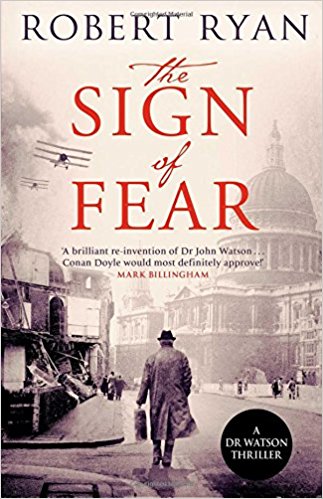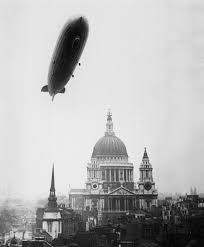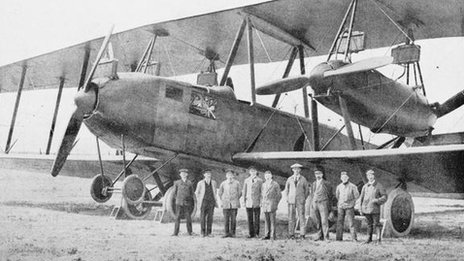Once again Dr John Watson, a serving major in the Royal Army Medical Corps, is thrust, unwillingly, into action. This time the setting is London, a London that is under siege in 1917.
Everything is in short supply — food, medicine, clothes, manpower — as the U-Boat stranglehold tightens, cutting off supplies of everything.

Moreover, the city is being bombed, first by Zeppelins, but when they proved too fragile and hard to handle, there was a technology leap to the long range bomber, Gothas and Giants. These aircraft operated from Belgium. They flew higher than the rudimentary anti-aircraft guns could reach, and higher than the Royal Flying Corps pursuit planes could climb, and so the bombers came day and night when the weather permitted.
The Zeppelin were so unreliable that at least one raid bombed Hull in the belief it was London. Consult a map to see the magnitude of the navigational error.
 A Zeppelin over London.
A Zeppelin over London.
Meanwhile, the privations killed the weak and vulnerable, sapped the energy of all, and depressed many. The bombs were few by subsequent standards, but they terrified one and all and paralysed the populace far beyond their destructive power. Per Wikipedia there were eighty air raids and add to that the false alarms.
It was the world of war that H. G. Wells had imagined, waged by machine. This bombing experience goes a good way to explaining the focus on airpower in the inter-war period.
In such a brew there were rumours of still other weapons to come, like canisters to drop poison gas or diseases, like giant cannons to bombard England from the continent, like …. As always these wild speculations were promoted by the press.
Amid all of this hysteria, Dr Watson finds himself drawn into a terrible nexus. There are anti-conscription plotters, the incipient Irish Republican Army, and German spies and saboteurs, along with criminals, each hard and work and perhaps in some kind of alliance. Added to that are the machinations of MI5, as the counter-intelligence agency, which seems even more sinister, if polite and civil in person. The defence of the realm (DORA) seems to justify anything and everything.
Then it gets worse. All members of an important war committee go missing in one night! Watson, as his luck would have it, is the last person to have seen one of them…alive.
Once again Watson is battered and bruised, and barely able to walk, but walk he does: into another trap. He even takes to the air in more than one way.
Ryan’s evocation of 1917 London under siege is very well done, and much of it an eye-opener to this reader, leading me to consult many Wikipedia entries for a start I had always thought that the bombing in the Great War was a few explosives dropped by wandering Zeppelins. There was much more to it.
There are many loose ends in this title, as with the earlier ones. It is by no means clear to this reader that the plotters were working alone or in tandem, the death of Ilse Brandt is muddled, why was the captain arrested at the end, did Watson land safely or not… While the opening haste is explained at the end, it begs one principal question, why did that captain allow the nurse on board if he knew what was to happen, and if he did not, why was he culpable.
It ends abruptly as though time was called not because resolution had been achieved.
In 1917 with its own resources, including civilian morale, wearing down, despite the closure of the Eastern Front, the German war cabinet gambled on a throw of the dice to drive England to the table before the United States entered the war.* The conclusion had been reached in Berlin that the United States would sooner rather than later enter the war on the British side. To preempt that entrance, the decision was to do everything possible to drive Britain to terms, if not surrender. Seeing no way to break the stalemate on the Western Front, other fronts had to be enhanced: espionage, and the sea and the air.
The chief result of this decision was the official declaration of unrestricted submarine warfare. No ship would be safe, neutral, unarmed, far away, or bearing Red Cross markings, all would be targets. The calculus was that a denial of supplies would starve England into submission before the Yanks arrived.
This much can be found in most detailed histories of the conflict. As often is the case the direction of casual arrows is by no means clear, because the advent of explicit and authorised unrestricted submarine attacks is the very matter that prompted President Woodrow Wilson’s reluctant move to war and convinced and the even more reluctant Congress to concur. One could say that the German decision produced the very result it had been intended to avert.
What was new to me was the accompanying bombing campaign which was partly aimed at the shipping infrastructure on the docklands, but since the accuracy of the attacks was, well, there was no accuracy, and so the effective target was the city of London, though other ports like Southampton were also hit, sometimes by accident or mistake as Hull above.
In both submarines and bombers, the Germans had for a time technical superiority over the counter-measures.
 One of about eighty Giant bombers that operated from Belgium against England.
One of about eighty Giant bombers that operated from Belgium against England.
England was the target of the bombers rather than France because the Berlin assessment was that aiding the French would not motivate public or political opinion in the United States, and if Britain could be subdued, France would follow, one way or another. Also France was much less dependent on shipping for food.
*The Eastern Front did close with the Communist coup d’état in Russia and the peace with the Soviet Union, but the turmoil there was great and continued, many, many German and Austrian troops remained engaged there in Poland, Finland, and Rumania, in particular, as warring elements battled for spoils.
Skip to content
